Challenges Faced by Nurses during COVID-19 in Surgical Ward: A Thematic Review
Added on 2023-06-11
26 Pages5937 Words197 Views
University Research Ethics Committee (February
2018)
Health and
social care
research
2018)
Health and
social care
research
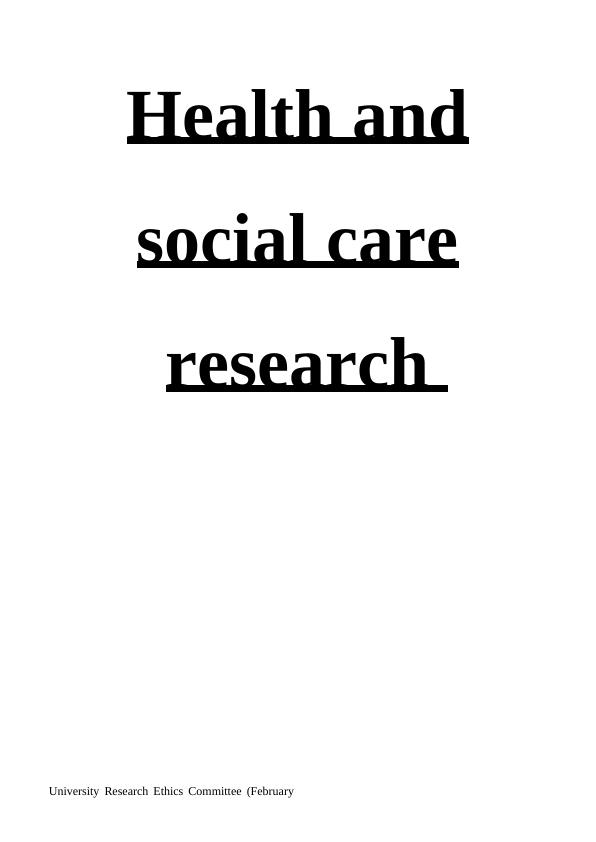
University Research Ethics Committee (February
2018)
Table of Contents
INTRODUCTION...........................................................................................................................3
MAIN BODY..................................................................................................................................3
Aim..............................................................................................................................................3
Objectives....................................................................................................................................3
Background (contextual) information..........................................................................................3
rationale of the research...............................................................................................................3
Methodology and methods..........................................................................................................3
Consideration of the importance of ethical practice in research..................................................5
A thematic review of published literature related to the research topic......................................5
To evaluate impact on nurses due to COVID 19.........................................................................5
To analyze different leadership styles used by nurses during COVID 19...................................5
To identify the impact on mental health of nurses during COVID 19........................................5
Discussion of the findings of the review.....................................................................................5
Conclusion and recommendations for future research, policy, and/or practice..........................6
CONCLUSION................................................................................................................................6
REFERENCES................................................................................................................................7
2018)
Table of Contents
INTRODUCTION...........................................................................................................................3
MAIN BODY..................................................................................................................................3
Aim..............................................................................................................................................3
Objectives....................................................................................................................................3
Background (contextual) information..........................................................................................3
rationale of the research...............................................................................................................3
Methodology and methods..........................................................................................................3
Consideration of the importance of ethical practice in research..................................................5
A thematic review of published literature related to the research topic......................................5
To evaluate impact on nurses due to COVID 19.........................................................................5
To analyze different leadership styles used by nurses during COVID 19...................................5
To identify the impact on mental health of nurses during COVID 19........................................5
Discussion of the findings of the review.....................................................................................5
Conclusion and recommendations for future research, policy, and/or practice..........................6
CONCLUSION................................................................................................................................6
REFERENCES................................................................................................................................7
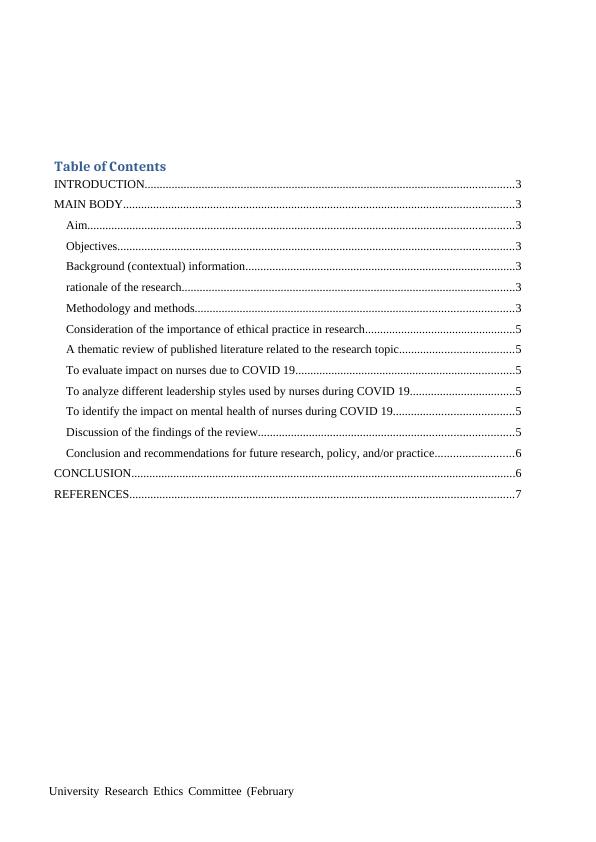
University Research Ethics Committee (February
2018)
INTRODUCTION
Leadership has been identified as a key factor in the development of a high-quality corporate
culture and effective health-care delivery. Other research that employed primary quantitative data,
like ours, found a robust link between leadership and care safety, efficacy, and equity. For example,
transformational leadership improves the culture and structural empowerment of nursing units. This
has an effect on nurses' organisational commitment, resulting in improved job satisfaction,
productivity, nursing retention, patient safety, and overall safety climate, as well as positive health
outcomes.
MAIN BODY
Aim
To evaluate the challenges faced by nurses at the time of COVID 19 in surgical ward.
Objectives
To evaluate impact on nurses due to COVID 19
To analyze different leadership styles used by nurses during COVID 19
To identify the impact on mental health of nurses during COVID 19
Background (contextual) information
Individuals with pre-existing mental health disorders, as well as healthy people, are more
anxious when they are faced with the unknown. People's feelings and emotions would most likely
include uncertainty and worry, according to the estimates for Covid-19 mental health repercussions.
Furthermore, erroneous perceptions of risk and terror would frequently encourage undesirable
societal behaviours. 4 These encounters could lead to a wide range of public mental health issues,
including emotional reactions (such as anger, insomnia or fear of illness even for those not exposed)
are discussed in this research. During the pandemic, nurses have become afraid and anxious that the
virus will infect them and affect their families, especially when they witness their co-workers getting
infected. Also, asymptomatic patients and the fact that there is still no cure for COVID-19 increase
these concerns. The other problems are: the difficulty in triaging emergency patients suspected to
have COVID-19, which has the potential of increasing the spread of the disease among emergency
patients; limited isolation wards and personal protective equipment (PPE); difficulty in determining
the level of care required; and insufficient critical care settings to meet the increasing demand. Along
with this, it has been also seen that the Lack of knowledge of the novel pathogen and pandemic
preparedness for control and management of infections among nurses often lead to delayed
diagnosis, disease transmission among nurses and poor infection control practices. Therefore, current
2018)
INTRODUCTION
Leadership has been identified as a key factor in the development of a high-quality corporate
culture and effective health-care delivery. Other research that employed primary quantitative data,
like ours, found a robust link between leadership and care safety, efficacy, and equity. For example,
transformational leadership improves the culture and structural empowerment of nursing units. This
has an effect on nurses' organisational commitment, resulting in improved job satisfaction,
productivity, nursing retention, patient safety, and overall safety climate, as well as positive health
outcomes.
MAIN BODY
Aim
To evaluate the challenges faced by nurses at the time of COVID 19 in surgical ward.
Objectives
To evaluate impact on nurses due to COVID 19
To analyze different leadership styles used by nurses during COVID 19
To identify the impact on mental health of nurses during COVID 19
Background (contextual) information
Individuals with pre-existing mental health disorders, as well as healthy people, are more
anxious when they are faced with the unknown. People's feelings and emotions would most likely
include uncertainty and worry, according to the estimates for Covid-19 mental health repercussions.
Furthermore, erroneous perceptions of risk and terror would frequently encourage undesirable
societal behaviours. 4 These encounters could lead to a wide range of public mental health issues,
including emotional reactions (such as anger, insomnia or fear of illness even for those not exposed)
are discussed in this research. During the pandemic, nurses have become afraid and anxious that the
virus will infect them and affect their families, especially when they witness their co-workers getting
infected. Also, asymptomatic patients and the fact that there is still no cure for COVID-19 increase
these concerns. The other problems are: the difficulty in triaging emergency patients suspected to
have COVID-19, which has the potential of increasing the spread of the disease among emergency
patients; limited isolation wards and personal protective equipment (PPE); difficulty in determining
the level of care required; and insufficient critical care settings to meet the increasing demand. Along
with this, it has been also seen that the Lack of knowledge of the novel pathogen and pandemic
preparedness for control and management of infections among nurses often lead to delayed
diagnosis, disease transmission among nurses and poor infection control practices. Therefore, current
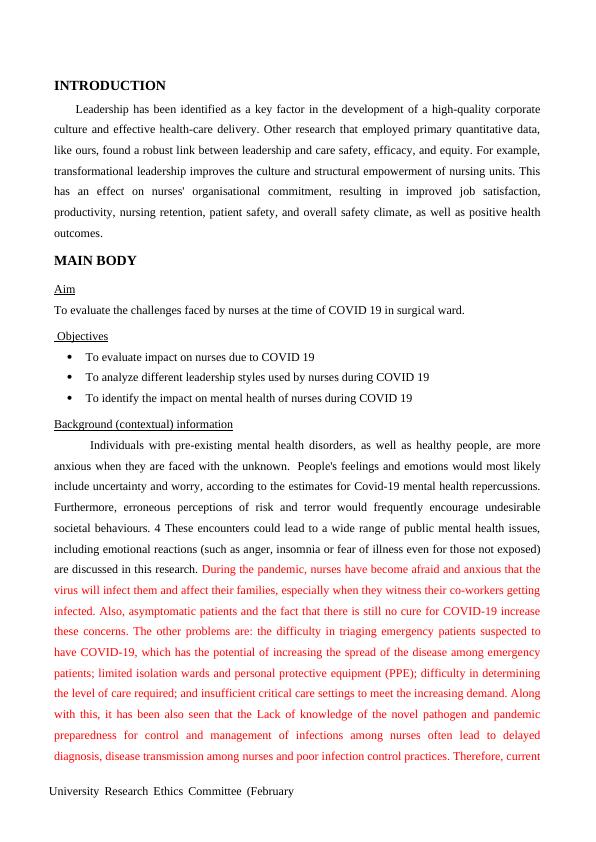
University Research Ethics Committee (February
2018)
project is investigation is being conducted and undertaken to analysis and review about the
challenges faced by nurses at the time of COVID 19 in surgical ward.
rationale of the research
This research is conducted for analysing the negative consequences on nurses due to COVID 19
pandemic. This signifies the way in which nurses have to tackle the stressful condition and make best
out of it. There is also need to manage and develop leadership to have control over situations at
surgical ward.
Methodology and methods
Research technique is a way for gathering and storing information in order to do research in an
orderly fashion. The investigator can use research methodology to analyse and interpret data in a
meaningful way. Research technique is a notion that allows researchers to assess the topic's
dependability and validity. As a result, the investigator has a variety of approaches to choose from in
order to conduct the inquiry in a systematic manner.
Research Design: Research design is a research method that assists investigators in analysing the
problem and collecting data in order to complete the study. Researchers can achieve the
investigation's goals and objectives more effectively and efficiently by employing research design.
Exploratory, experimental, and descriptive research designs are the three types of research designs.
Because the material is collected in a qualitative manner, the researcher has chosen an exploratory
research strategy for this study. The exploratory research approach aids in the collection of
qualitative data that is difficult to acquire and comprehend. The investigator can gather insight
knowledge about the subject matter with the use of this study design. Exploratory research designs
are chosen because they analyse secondary data in a methodical and appropriate manner. Researchers
can determine how to employ research instruments and what benefits they provide through research
design. The basic goal of study design is to create a plan that allows investigators to analyse the
cause and effect relationship between both dependent and independent variables (Brennen, 2021).
Research instrument: A research instrument is a tool that the investigator uses to gather, analyse, and
measure data relevant to the current topic. It comes in a variety of formats, including survey,
interview, scales, exams, questionnaires, and checklists. The interview method was used for this
study since it aids in the collection of data about the subject. The investigator develops open ended
questions for asking the participants and acquiring data linked to the present issue via selecting
interview (Camic, 2021). The researcher will ask selected respondents questions in order to acquire
2018)
project is investigation is being conducted and undertaken to analysis and review about the
challenges faced by nurses at the time of COVID 19 in surgical ward.
rationale of the research
This research is conducted for analysing the negative consequences on nurses due to COVID 19
pandemic. This signifies the way in which nurses have to tackle the stressful condition and make best
out of it. There is also need to manage and develop leadership to have control over situations at
surgical ward.
Methodology and methods
Research technique is a way for gathering and storing information in order to do research in an
orderly fashion. The investigator can use research methodology to analyse and interpret data in a
meaningful way. Research technique is a notion that allows researchers to assess the topic's
dependability and validity. As a result, the investigator has a variety of approaches to choose from in
order to conduct the inquiry in a systematic manner.
Research Design: Research design is a research method that assists investigators in analysing the
problem and collecting data in order to complete the study. Researchers can achieve the
investigation's goals and objectives more effectively and efficiently by employing research design.
Exploratory, experimental, and descriptive research designs are the three types of research designs.
Because the material is collected in a qualitative manner, the researcher has chosen an exploratory
research strategy for this study. The exploratory research approach aids in the collection of
qualitative data that is difficult to acquire and comprehend. The investigator can gather insight
knowledge about the subject matter with the use of this study design. Exploratory research designs
are chosen because they analyse secondary data in a methodical and appropriate manner. Researchers
can determine how to employ research instruments and what benefits they provide through research
design. The basic goal of study design is to create a plan that allows investigators to analyse the
cause and effect relationship between both dependent and independent variables (Brennen, 2021).
Research instrument: A research instrument is a tool that the investigator uses to gather, analyse, and
measure data relevant to the current topic. It comes in a variety of formats, including survey,
interview, scales, exams, questionnaires, and checklists. The interview method was used for this
study since it aids in the collection of data about the subject. The investigator develops open ended
questions for asking the participants and acquiring data linked to the present issue via selecting
interview (Camic, 2021). The researcher will ask selected respondents questions in order to acquire
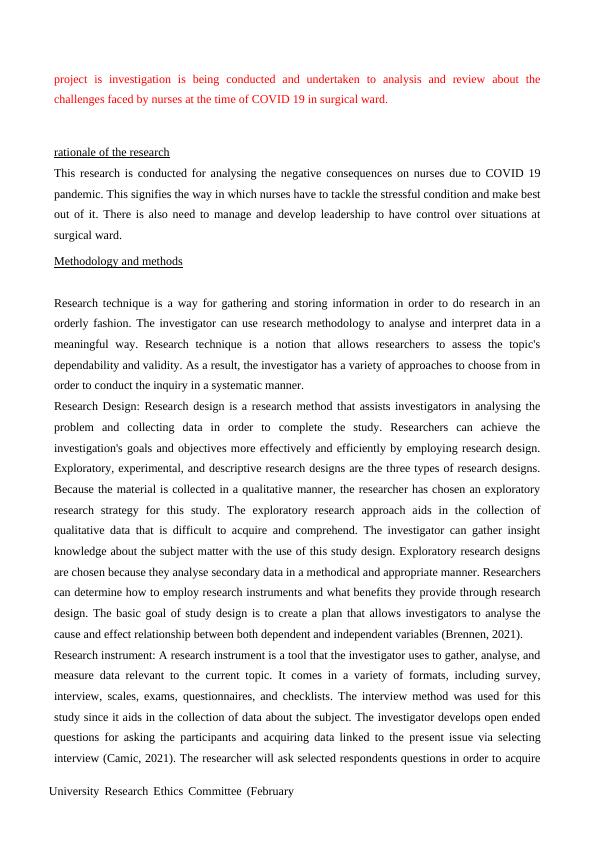
University Research Ethics Committee (February
2018)
information on the topic, and they will also focus on documenting oral answers made by the
respondents. The reason for using an interview as a research tool is that it allows for a greater
comprehension of the study, allowing the research objectives to be met more successfully. It has
been determined that the current study is credible because the investigator has created open-ended
questions allowing participants to provide replies and their perspectives on the subject. The study is
trustworthy since the researcher posed direct questions to a small number of participants, which
helps to reduce bias. The researcher has asked legitimate questions, as a result of which it has been
decided that the current study aids in boosting validity. If the inquiry is valid, it aids in the
production of superior results, allowing the study goals and objectives to be met more effectively.
Data collection and analysis: A data collecting method is a research tool that the investigator
employs to gather and analyse data in a meaningful way. Primary and secondary data collecting
methods are the two types of data collection methods. Within the scope of this investigation, the
investigator has chosen both methods for gathering data on the research issue. The secondary data
collection approach was chosen by the researcher because it aids in gathering published and used
information relevant to the current topic (Mohajan, 2018). The secondary data gathering method was
chosen since it gives existing information on the subject. Publications, articles, books, newspapers,
and journals are examples of secondary data sources. In addition, the researcher has chosen primary
data collecting.
Consideration of the importance of ethical practice in research
One of the most crucial factors that the researcher must consider when undertaking a big
investigation is ethics. The researcher can perform the research in a meaningful and ethical manner
by using ethical practises. Ethical methods aid in reaching the investigation's goals and objectives in
a timely and effective manner. As a result, there are various ethical rules that the investigator must
follow in order to finish the inquiry correctly, such as avoiding misleading methods, reducing the
risk of harming others, and maintaining the confidentiality of information (Ngozwana, 2018). It is
vital for the researcher to obtain the consent of the participants in order to gather data in an ethical
manner.
A thematic review of published literature related to the research topic
A thematic literature review of the selected topic and objective has been provided below that
comprises of the author organizes and discusses existing literature based on themes or theoretical
concepts he or she feels are important to understanding the topic.
2018)
information on the topic, and they will also focus on documenting oral answers made by the
respondents. The reason for using an interview as a research tool is that it allows for a greater
comprehension of the study, allowing the research objectives to be met more successfully. It has
been determined that the current study is credible because the investigator has created open-ended
questions allowing participants to provide replies and their perspectives on the subject. The study is
trustworthy since the researcher posed direct questions to a small number of participants, which
helps to reduce bias. The researcher has asked legitimate questions, as a result of which it has been
decided that the current study aids in boosting validity. If the inquiry is valid, it aids in the
production of superior results, allowing the study goals and objectives to be met more effectively.
Data collection and analysis: A data collecting method is a research tool that the investigator
employs to gather and analyse data in a meaningful way. Primary and secondary data collecting
methods are the two types of data collection methods. Within the scope of this investigation, the
investigator has chosen both methods for gathering data on the research issue. The secondary data
collection approach was chosen by the researcher because it aids in gathering published and used
information relevant to the current topic (Mohajan, 2018). The secondary data gathering method was
chosen since it gives existing information on the subject. Publications, articles, books, newspapers,
and journals are examples of secondary data sources. In addition, the researcher has chosen primary
data collecting.
Consideration of the importance of ethical practice in research
One of the most crucial factors that the researcher must consider when undertaking a big
investigation is ethics. The researcher can perform the research in a meaningful and ethical manner
by using ethical practises. Ethical methods aid in reaching the investigation's goals and objectives in
a timely and effective manner. As a result, there are various ethical rules that the investigator must
follow in order to finish the inquiry correctly, such as avoiding misleading methods, reducing the
risk of harming others, and maintaining the confidentiality of information (Ngozwana, 2018). It is
vital for the researcher to obtain the consent of the participants in order to gather data in an ethical
manner.
A thematic review of published literature related to the research topic
A thematic literature review of the selected topic and objective has been provided below that
comprises of the author organizes and discusses existing literature based on themes or theoretical
concepts he or she feels are important to understanding the topic.
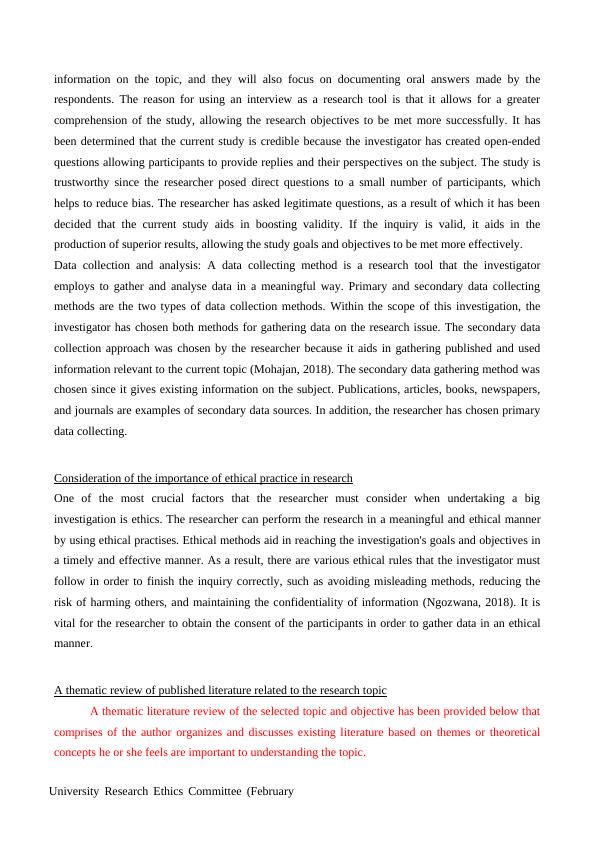
University Research Ethics Committee (February
2018)
To evaluate impact on nurses due to COVID 19
Nurses are frequently subjected to high levels of psychological stress as a result of a heavy workload,
long hours, shift responsibilities, and working in a high-risk workplace. Nurses are front-line
healthcare workers who work in acute care hospitals, long-term care facilities, nursing homes,
schools, communities, and government health-care organisations. Nurses' many duties and functions
are especially vital during this COVID-19 epidemic, as they provide health education, screening
services, and support to the general public and high-risk patients. 19. Measuring the emotional effect
of the COVID-19 infection on nurses is critical for health officials to create prevention methods and
effective medical interventions to mitigate the outbreak's negative consequences. Despite this, there
have been no research in the study region on the ecology of depressed, nervousness, and stress in
nurses. As a result, the purpose of this study is to determine the prevalence of despair, nervousness,
and stress within nurse, as well as the processes that influence to these conditions. Along with this, as
per the view point of the Reljić, N.M., Pajnkihar, M. and Fekonja, Z., 2019, it has been seen that the
Nurses also tend to face a negative impact and challenges as they are overloaded with work and does
not even have the time for the sleep quality. Beside this, while the spread of the covid-19 many other
symptoms and negative impact on nurses has been also seen in form of the depression, anxiety and
stress presented reflecting the variation over the COVID-19 outbreak. The only factors which are
directly related to the COVID-19 outbreak and that were associated with the negative impact of
covid-19 tend to comprises and includes of the symptoms of depression, anxiety and stress were the
fear to infect others and the fear to be infected Beside this, the risk associated with the higher fear of
being infected or to infect someone corresponded to increased symptoms of depression, anxiety and
stress is also been seen as the negative impact of covid-19 on the working of nurses.
To analyze different leadership styles used by nurses during COVID 19
There were significant links discovered between workplace enforcement and practise
environment conditions for staff nurses and patient safety. Significant variations in patient-level
quality and safety measures, such as mortality patterns, patient safety, equity, and efficacy in care,
were linked to distinctive leadership's authentic hands-on leadership style, behaviours, and
organisational practises. Transactional leadership had a weak association with effective nursing unit
organisation culture, whereas transformational leadership had a strong relationship. Furthermore,
laissez-faire leadership was linked to a negative culture in nursing units. The results showed that a
greater total structural empowerment score was linked to a higher degree of safety, and that
empowering workplaces had a favourable impact on nurse quality of care.
2018)
To evaluate impact on nurses due to COVID 19
Nurses are frequently subjected to high levels of psychological stress as a result of a heavy workload,
long hours, shift responsibilities, and working in a high-risk workplace. Nurses are front-line
healthcare workers who work in acute care hospitals, long-term care facilities, nursing homes,
schools, communities, and government health-care organisations. Nurses' many duties and functions
are especially vital during this COVID-19 epidemic, as they provide health education, screening
services, and support to the general public and high-risk patients. 19. Measuring the emotional effect
of the COVID-19 infection on nurses is critical for health officials to create prevention methods and
effective medical interventions to mitigate the outbreak's negative consequences. Despite this, there
have been no research in the study region on the ecology of depressed, nervousness, and stress in
nurses. As a result, the purpose of this study is to determine the prevalence of despair, nervousness,
and stress within nurse, as well as the processes that influence to these conditions. Along with this, as
per the view point of the Reljić, N.M., Pajnkihar, M. and Fekonja, Z., 2019, it has been seen that the
Nurses also tend to face a negative impact and challenges as they are overloaded with work and does
not even have the time for the sleep quality. Beside this, while the spread of the covid-19 many other
symptoms and negative impact on nurses has been also seen in form of the depression, anxiety and
stress presented reflecting the variation over the COVID-19 outbreak. The only factors which are
directly related to the COVID-19 outbreak and that were associated with the negative impact of
covid-19 tend to comprises and includes of the symptoms of depression, anxiety and stress were the
fear to infect others and the fear to be infected Beside this, the risk associated with the higher fear of
being infected or to infect someone corresponded to increased symptoms of depression, anxiety and
stress is also been seen as the negative impact of covid-19 on the working of nurses.
To analyze different leadership styles used by nurses during COVID 19
There were significant links discovered between workplace enforcement and practise
environment conditions for staff nurses and patient safety. Significant variations in patient-level
quality and safety measures, such as mortality patterns, patient safety, equity, and efficacy in care,
were linked to distinctive leadership's authentic hands-on leadership style, behaviours, and
organisational practises. Transactional leadership had a weak association with effective nursing unit
organisation culture, whereas transformational leadership had a strong relationship. Furthermore,
laissez-faire leadership was linked to a negative culture in nursing units. The results showed that a
greater total structural empowerment score was linked to a higher degree of safety, and that
empowering workplaces had a favourable impact on nurse quality of care.
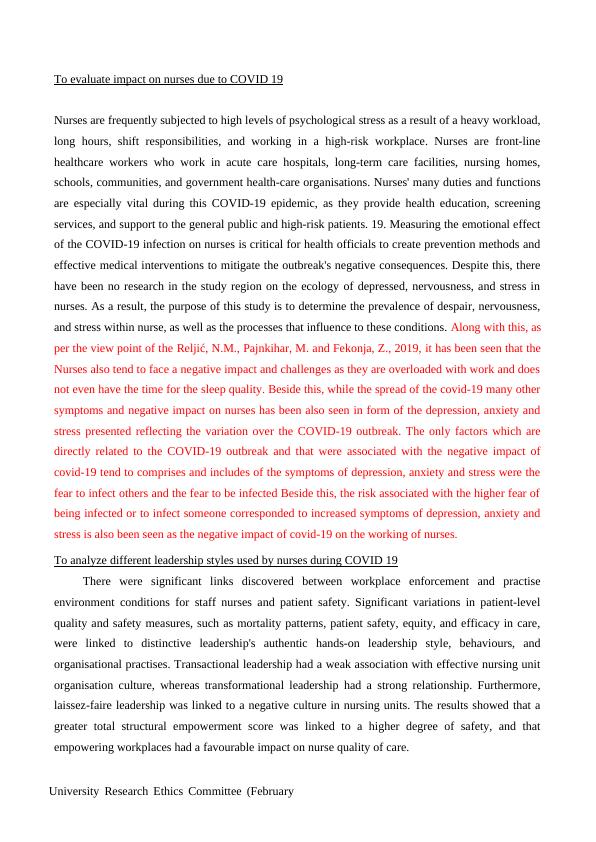
End of preview
Want to access all the pages? Upload your documents or become a member.
Related Documents
Challenges Faced by Nurses in Surgical Ward During COVID-19 Pandemiclg...
|8
|1899
|489
Psychological Factors Contributing to Addressing the Covid-19 Pandemiclg...
|9
|578
|331
Impact of COVID-19 on Mental Health of NHS Doctors: A Case Study of UK Healthcare Professionalslg...
|12
|3735
|459
Healthcare Issueslg...
|4
|600
|31
Student nurses perceived risk of COVID19 and associated stress levelslg...
|5
|768
|481
Additional Challenges for Health Care Workers Caused by Covid-19lg...
|15
|5316
|345
